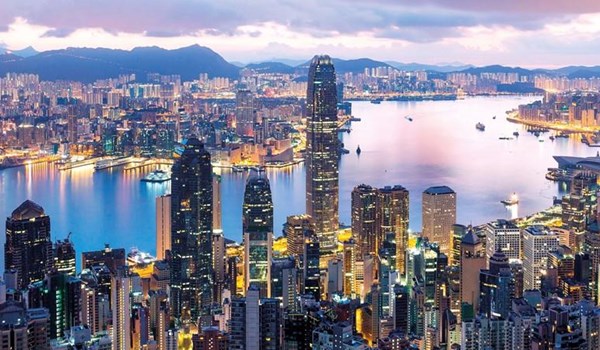Jurisdictions
Regions
Industry Sectors
04/11/22
HONG KONG: Finance summit spurs questions about the business hub’s future.

As published on japantimes.co.jp, Friday 4 November, 2022.
Hong Kong is “open for business” — that was the official narrative of the Hong Kong Monetary Authority’s Global Financial Leaders’ Investment Summit that kicked off with a series of related gatherings this week, following prolonged pandemic curbs. But the event, which brought top bank executives to the city, has triggered criticism from human rights advocates.
The summit’s theme of “navigating beyond uncertainty” proved prescient after a rocky start, with reports of some senior executives withdrawing at the last minute. As the week draws to a close, it remains to be seen just how convincing that message was.
Speaking by video link from outside of the city after testing positive for COVID-19, Finance Secretary Paul Chan — without a hint of irony — told attendees at Monday’s FinTech Week launch that “We’re back.”
The summit and surrounding events follow criticism of weekslong quarantines and flight bans throughout the pandemic — one of the factors driving the city’s talent exodus, which has seen professionals relocate to Singapore and other markets such as Japan.
During his keynote speech Wednesday, Hong Kong Chief Executive John Lee gave something of a hard sales pitch on Hong Kong’s benefits, highlighting the city’s connectivity with the rest of China, access to financial markets and local attractions such as food and entertainment.
Lee touched briefly on the crushed pro-democracy protest movement of 2019, saying “law and order has returned, the worst is behind us.”
“Freedom of speech, of the press, of assembly are enshrined in and protected by the basic law,” he told a silent crowd of around 200.
Rights groups have criticized those in attendance, suggesting their appearance lent credibility to a brutal authoritarian regime. Last month, nonprofit group Committee for Freedom in Hong Kong Foundation illuminated buildings in New York’s financial district with protest messages such as “Wall Street CEOs: Don’t support human rights abuses in Hong Kong,” calling on executives to skip the event.
But Surya Deva, an expert on business and human rights at Macquarie Law School in Sydney who was previously based in Hong Kong, said that while businesses participating in the summit “are likely to face some bashing from civil society groups and negative publicity in the Western media, they are unlikely to bear any significant or long-lasting negative impact.”
Samuel Bickett, an outspoken human rights advocate and former compliance director for Bank of America Merrill Lynch, who was deported from Hong Kong this year after serving jail time for assaulting a plain clothes police officer in 2019, said the attendance of company leaders was likely a calculated decision.
“They’ve made a risk assessment that they’re likely to get more blowback from the Chinese government for not attending, than they think they’ll get blowback from their home markets, government or public for attending,” Bickett said.
Deva echoed this notion.
“Companies still tend to use human rights as a trading commodity to increase profits: They speak up about human rights issues as per their business convenience,” he said.
Still, media were quick to note the absence of Barclays’ CEO C.S. Venkatakrishnan — who skipped his Asia trip — as well as Citigroup CEO Jane Fraser and Blackstone President Jonathan Gray, who skipped the event after reportedly contracting COVID-19.
While some business leaders may have sidestepped the political issues, UBS Group Chairman Colm Kelleher made his allegiances clear during a panel discussion Wednesday with David Solomon of Goldman Sachs and James Gorman of Morgan Stanley, saying, “We’re all very pro-China.”
“We’re not reading the American press, we all buy the (China) story,” Kelleher said, referencing earlier comments made by Fang Xinghai, vice chairman of the China Securities Regulatory Commission, advising attendees not to read international media when following China developments.
Lloyd Chan, senior economist at Oxford Economics, said that Hong Kong’s economic position has remained resilient despite a raft of challenges.
“Notwithstanding COVID restrictions, U.S.-China tensions and the implementation of the national security law, Hong Kong has been able to maintain its standing as a global financing hub, albeit losing some competitiveness to Singapore,” Chan said.
“Foreign banks have maintained a significant presence in Hong Kong, while there are no significant capital outflows from the banking sector,” he said, predicting that closer mutual access through cross-border connect programs linking Hong Kong and the rest of China will generate more business opportunities.
However, Bickett said doing business in Hong Kong should be more than a financial equation for business leaders.
“What I want to say, to my former colleagues at the senior levels, is whatever the risk calculus, do they really want to be showing up in places like Hong Kong, meeting with known human rights abusers?” he asked.
“(Business leaders) should think about their legacies, their company’s legacies and how this is going to look as things get worse and worse in a more authoritarian, more extreme, more violent China.”



